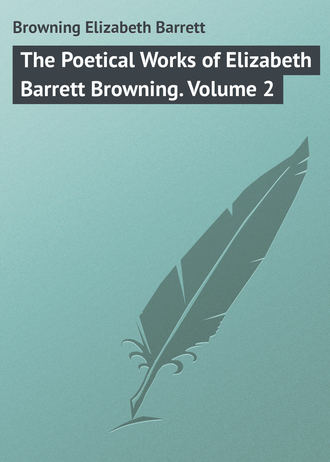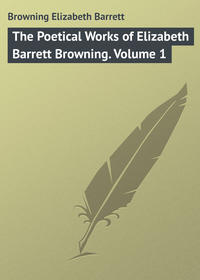 полная версия
полная версияThe Poetical Works of Elizabeth Barrett Browning. Volume 2
TO BETTINE,
THE CHILD-FRIEND OF GOETHE
"I have the second sight, Goethe!" —Letters of a Child.IBettine, friend of Goethe,Hadst thou the second sight —Upturning worship and delightWith such a loving dutyTo his grand face, as women will,The childhood 'neath thine eyelids still?II– Before his shrine to doom thee,Using the same child's smileThat heaven and earth, beheld erewhileFor the first time, won from theeEre star and flower grew dim and deadSave at his feet and o'er his head?III– Digging thine heart and throwingAway its childhood's gold,That so its woman-depth might holdHis spirit's overflowing?(For surging souls, no worlds can bound,Their channel in the heart have found.)IVO child, to change appointed,Thou hadst not second sight!What eyes the future view arightUnless by tears anointed?Yea, only tears themselves can showThe burning ones that have to flow.VO woman, deeply loving,Thou hadst not second sight!The star is very high and bright,And none can see it moving.Love looks around, below, above,Yet all his prophecy is – love.VIThe bird thy childhood's playingSent onward o'er the sea,Thy dove of hope came back to theeWithout a leaf: art layingIts wet cold wing no sun can dry,Still in thy bosom secretly?VIIOur Goethe's friend, Bettine,I have the second sight!The stone upon his grave is white,The funeral stone between ye;And in thy mirror thou hast viewedSome change as hardly understood.VIIIWhere's childhood? where is Goethe?The tears are in thine eyes.Nay, thou shalt yet reorganizeThy maidenhood of beautyIn his own glory, which is smoothOf wrinkles and sublime in youth.IXThe poet's arms have wound thee,He breathes upon thy brow,He lifts thee upward in the glowOf his great genius round thee, —The childlike poet undefiledPreserving evermore The Child.MAN AND NATURE
A sad man on a summer dayDid look upon the earth and say —"Purple cloud the hill-top binding;Folded hills the valleys wind in;Valleys with fresh streams among you;Streams with bosky trees along you;Trees with many birds and blossoms;Birds with music-trembling bosoms;Blossoms dropping dews that wreathe youTo your fellow flowers beneath you;Flowers that constellate on earth;Earth that shakest to the mirthOf the merry Titan Ocean,All his shining hair in motion!Why am I thus the only oneWho can be dark beneath the sun?"But when the summer day was past,He looked to heaven and smiled at last,Self-answered so —"Because, O cloud,Pressing with thy crumpled shroudHeavily on mountain top, —Hills that almost seem to dropStricken with a misty deathTo the valleys underneath, —Valleys sighing with the torrent, —Waters streaked with branches horrent, —Branchless trees that shake your headWildly o'er your blossoms spreadWhere the common flowers are found, —Flowers with foreheads to the ground, —Ground that shriekest while the seaWith his iron smiteth thee —I am, besides, the only oneWho can be bright without the sun."A SEA-SIDE WALK
IWe walked beside the seaAfter a day which perished silentlyOf its own glory – like the princess weirdWho, combating the Genius, scorched and seared,Uttered with burning breath, "Ho! victory!"And sank adown, a heap of ashes pale:So runs the Arab tale.IIThe sky above us showedA universal and unmoving cloudOn which the cliffs permitted us to seeOnly the outline of their majesty,As master-minds when gazed at by the crowd:And shining with a gloom, the water greySwang in its moon-taught way.IIINor moon, nor stars were out;They did not dare to tread so soon about,Though trembling, in the footsteps of the sun:The light was neither night's nor day's, but oneWhich, life-like, had a beauty in its doubt,And silence's impassioned breathings roundSeemed wandering into sound.IVO solemn-beating heartOf nature! I have knowledge that thou artBound unto man's by cords he cannot sever;And, what time they are slackened by him ever,So to attest his own supernal part,Still runneth thy vibration fast and strongThe slackened cord along:VFor though we never spokeOf the grey water and the shaded rock,Dark wave and stone unconsciously were fusedInto the plaintive speaking that we usedOf absent friends and memories unforsook;And, had we seen each other's face, we hadSeen haply each was sad.THE SEA-MEW
AFFECTIONATELY INSCRIBED TO M. E. H
IHow joyously the young sea-mewLay dreaming on the waters blueWhereon our little bark had thrownA little shade, the only one,But shadows ever man pursue.IIFamiliar with the waves and freeAs if their own white foam were he,His heart upon the heart of oceanLay learning all its mystic motion,And throbbing to the throbbing sea.IIIAnd such a brightness in his eyeAs if the ocean and the skyWithin him had lit up and nurstA soul God gave him not at first,To comprehend their majesty.IVWe were not cruel, yet did sunderHis white wing from the blue waves under,And bound it, while his fearless eyesShone up to ours in calm surprise,As deeming us some ocean wonder.VWe bore our ocean bird untoA grassy place where he might viewThe flowers that curtsey to the bees,The waving of the tall green trees,The falling of the silver dew.VIBut flowers of earth were pale to himWho had seen the rainbow fishes swim;And when earth's dew around him layHe thought of ocean's wingèd spray,And his eye waxèd sad and dim.VIIThe green trees round him only madeA prison with their darksome shade;And drooped his wing, and mournèd heFor his own boundless glittering sea —Albeit he knew not they could fade.VIIIThen One her gladsome face did bring,Her gentle voice's murmuring,In ocean's stead his heart to moveAnd teach him what was human love:He thought it a strange, mournful thing.IXHe lay down in his grief to die,(First looking to the sea-like skyThat hath no waves) because, alas!Our human touch did on him pass,And, with our touch, our agony.FELICIA HEMANS
TO L. E. L.,
REFERRING TO HER MONODY ON THE POETESS
IThou bay-crowned living One that o'er the bay-crowned Dead art bowing,And o'er the shadeless moveless brow the vital shadow throwing,And o'er the sighless songless lips the wail and music wedding,And dropping o'er the tranquil eyes the tears not of their shedding! —IITake music from the silent Dead whose meaning is completer,Reserve thy tears for living brows where all such tears are meeter,And leave the violets in the grass to brighten where thou treadest,No flowers for her! no need of flowers, albeit "bring flowers!" thou saidest.IIIYes, flowers, to crown the "cup and lute," since both may come to breaking,Or flowers, to greet the "bride" – the heart's own beating works its aching;Or flowers, to soothe the "captive's" sight, from earth's free bosom gathered,Reminding of his earthly hope, then withering as it withered:IVBut bring not near the solemn corse a type of human seeming,Lay only dust's stern verity upon the dust undreaming:And while the calm perpetual stars shall look upon it solely,Her spherèd soul shall look on them with eyes more bright and holy.VNor mourn, O living One, because her part in life was mourning:Would she have lost the poet's fire for anguish of the burning?The minstrel harp, for the strained string? the tripod, for the afflatedWoe? or the vision, for those tears in which it shone dilated?VIPerhaps she shuddered while the world's cold hand her brow was wreathing,But never wronged that mystic breath which breathed in all her breathing,Which drew, from rocky earth and man, abstractions high and moving,Beauty, if not the beautiful, and love, if not the loving.VIISuch visionings have paled in sight; the Saviour she descrieth,And little recks who wreathed the brow which on His bosom lieth:The whiteness of His innocence o'er all her garments, flowing,There learneth she the sweet "new song" she will not mourn in knowing.VIIIBe happy, crowned and living One! and as thy dust decayethMay thine own England say for thee what now for Her it sayeth —"Albeit softly in our ears her silver song was ringing,The foot-fall of her parting soul is softer than her singing."L. E. L.'S LAST QUESTION
"Do you think of me as I think of you?"(From her poem written during the voyage to the Cape.)I"Do you think of me as I think of you,My friends, my friends?" – She said it from the sea,The English minstrel in her minstrelsy,While, under brighter skies than erst she knew,Her heart grew dark, and groped there as the blindTo reach across the waves friends left behind —"Do you think of me as I think of you?"IIIt seemed not much to ask – "as I of you?"We all do ask the same; no eyelids coverWithin the meekest eyes that question over:And little in the world the Loving doBut sit (among the rocks?) and listen forThe echo of their own love evermore —"Do you think of me as I think of you?"IIILove-learnèd she had sung of love and love, —And like a child that, sleeping with dropt headUpon the fairy-book he lately read,Whatever household noises round him move,Hears in his dream some elfin turbulence, —Even so suggestive to her inward sense,All sounds of life assumed one tune of love.IVAnd when the glory of her dream withdrew,When knightly gestes and courtly pageantriesWere broken in her visionary eyesBy tears the solemn seas attested true, —Forgetting that sweet lute beside her hand,She asked not, – "Do you praise me, O my land?"But, – "Think ye of me, friends, as I of you?"VHers was the hand that played for many a yearLove's silver phrase for England, smooth and well.Would God her heart's more inward oracleIn that lone moment might confirm her dear!For when her questioned friends in agonyMade passionate response, "We think of thee,"Her place was in the dust, too deep to hear.VICould she not wait to catch their answering breath?Was she content, content with ocean's soundWhich dashed its mocking infinite aroundOne thirsty for a little love? – beneathThose stars content, where last her song had gone, —They mute and cold in radiant life, as soonTheir singer was to be, in darksome death?8VIIBring your vain answers – cry, "We think of thee!"How think ye of her? warm in long agoDelights? or crowned with budding bays? Not so.None smile and none are crowned where lieth she,With all her visions unfulfilled save one,Her childhood's, of the palm-trees in the sun —And lo! their shadow on her sepulchre!VIII"Do ye think of me as I think of you?" —O friends, O kindred, O dear brotherhoodOf all the world! what are we that we shouldFor covenants of long affection sue?Why press so near each other when the touchIs barred by graves? Not much, and yet too muchIs this "Think of me as I think of you."IXBut while on mortal lips I shape anewA sigh to mortal issues, verilyAbove the unshaken stars that see us die,A vocal pathos rolls; and He who drewAll life from dust, and for all tasted death,By death and life and love appealing, saithDo you think of me as I think of you?1
For I say unto you that in Heaven their angels do always behold the face of my Father which is in Heaven —Matt. xviii, 10.
2
The Hindoo heaven is localized on the summit of Mount Meru – one of the mountains of Himalaya or Himmaleh, which signifies, I believe, in Sanscrit, the abode of snow, winter, or coldness.
3
Himadeva, the Indian god of love, is imagined to wander through the three worlds, accompanied by the humming-bird, cuckoo, and gentle breezes.
4
The casting of rice upon the head, and the fixing of the band or tali about the neck, are parts of the Hindoo marriage ceremonial.
5
The Ganges is represented as a white woman, with a water-lily in her right hand, and in her left a lute.
6
A fact rendered pathetically historical by Mr. Horne's report of his Commission. The name of the poet of "Orion" and "Cosmo de' Medici" has, however, a change of associations, and comes in time to remind me that we have some noble poetic heat of literature still, – however open to the reproach of being somewhat gelid in our humanity – 1844.
7
It is a Jewish tradition that Moses died of the kisses of God's lips.
8
Her lyric on the Polar Star came home with her latest papers.


